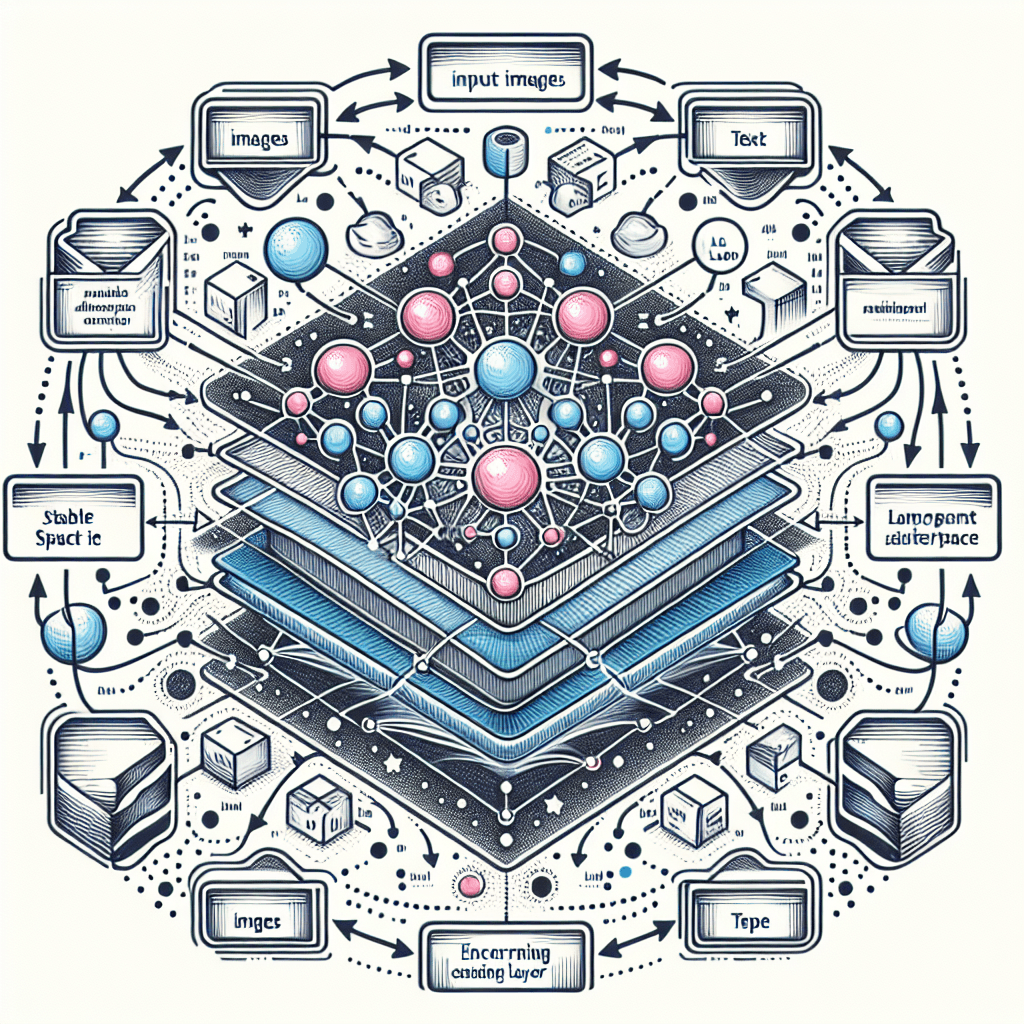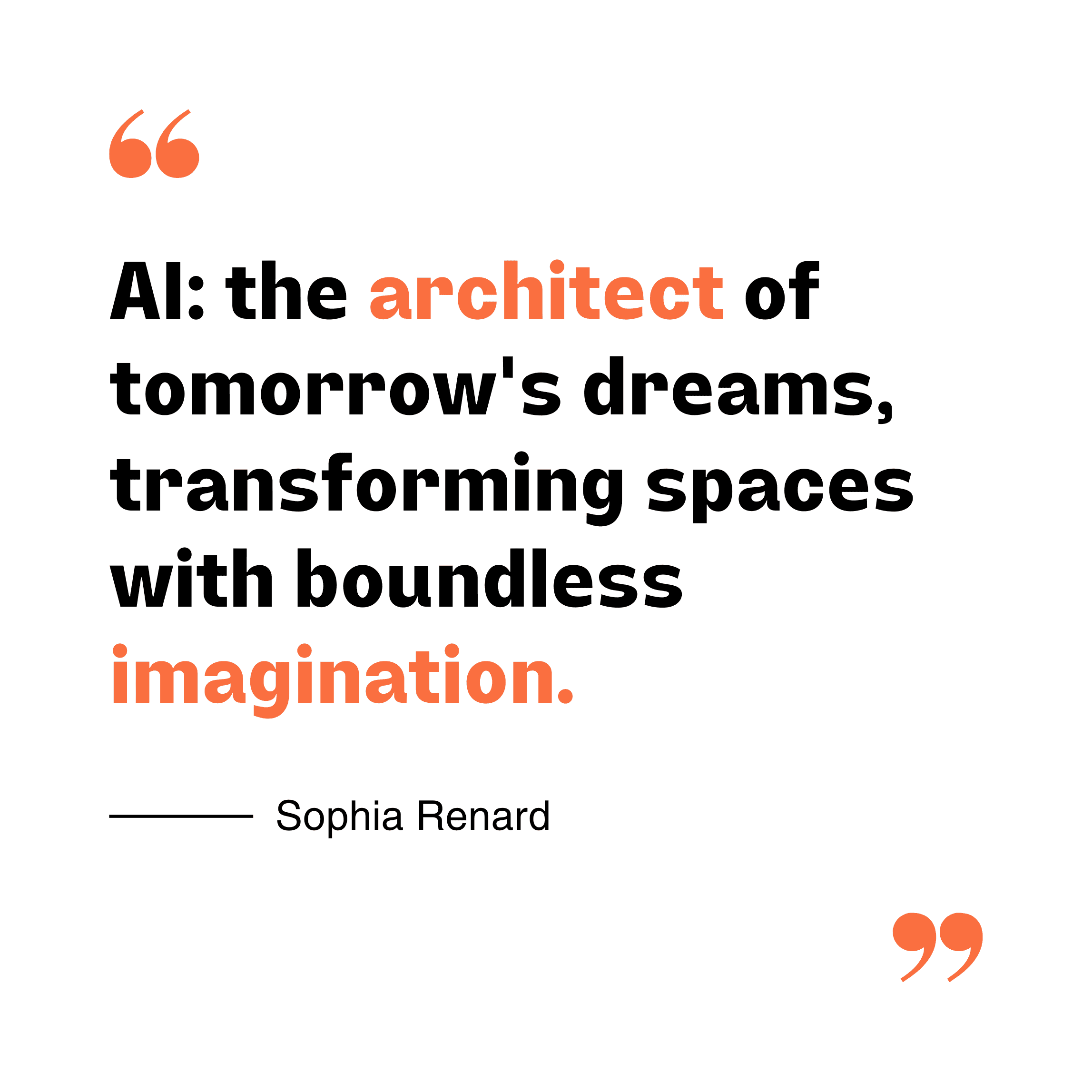How Generative AI is Revolutionizing Interior Design?
How Generative AI is Revolutionizing Interior Design?
23 juin 2024
Table of Contents
Introduction: Embracing the AI Revolution in AI Interior Design
Understanding Generative AI: The Foundation of Intelligent Design and the Modern Design Process and the Modern Design Process and the Modern Design Process and the Modern Design Process and the Modern Design Process
Revolutionizing Visualization: Virtual and Augmented Reality in Interior Design, Enhanced by AI Images
Personalized Recommendations: AI-Powered Tailored Home Design Solutions
Predicting Design Trends: AI Analytics for Staying Ahead of the Curve Using Advanced AI Algorithms
Streamlining Communication and Project Management: AI-Assisted Efficiency
The Future of Interior Design: Coexisting with AI, aided by tools like AI room planners and interior AI., aided by tools like AI room planners and interior AI., aided by tools like AI room planners and interior AI., aided by tools like AI room planners and interior AI., aided by tools like AI room planners and interior AI., aided by tools like AI room planners and interior AI., aided by tools like AI room planners and interior AI., aided by tools like AI room planners and interior AI.
Thank you for this lovely introduction from Design INK Co.
Table of Contents
Introduction: Embracing the AI Revolution in AI Interior Design
Understanding Generative AI: The Foundation of Intelligent Design and the Modern Design Process and the Modern Design Process and the Modern Design Process and the Modern Design Process and the Modern Design Process
Revolutionizing Visualization: Virtual and Augmented Reality in Interior Design, Enhanced by AI Images
Personalized Recommendations: AI-Powered Tailored Home Design Solutions
Predicting Design Trends: AI Analytics for Staying Ahead of the Curve Using Advanced AI Algorithms
Streamlining Communication and Project Management: AI-Assisted Efficiency
The Future of Interior Design: Coexisting with AI, aided by tools like AI room planners and interior AI., aided by tools like AI room planners and interior AI., aided by tools like AI room planners and interior AI., aided by tools like AI room planners and interior AI., aided by tools like AI room planners and interior AI., aided by tools like AI room planners and interior AI., aided by tools like AI room planners and interior AI., aided by tools like AI room planners and interior AI.
Thank you for this lovely introduction from Design INK Co.
Table of Contents
Introduction: Embracing the AI Revolution in AI Interior Design
Understanding Generative AI: The Foundation of Intelligent Design and the Modern Design Process and the Modern Design Process and the Modern Design Process and the Modern Design Process and the Modern Design Process
Revolutionizing Visualization: Virtual and Augmented Reality in Interior Design, Enhanced by AI Images
Personalized Recommendations: AI-Powered Tailored Home Design Solutions
Predicting Design Trends: AI Analytics for Staying Ahead of the Curve Using Advanced AI Algorithms
Streamlining Communication and Project Management: AI-Assisted Efficiency
The Future of Interior Design: Coexisting with AI, aided by tools like AI room planners and interior AI., aided by tools like AI room planners and interior AI., aided by tools like AI room planners and interior AI., aided by tools like AI room planners and interior AI., aided by tools like AI room planners and interior AI., aided by tools like AI room planners and interior AI., aided by tools like AI room planners and interior AI., aided by tools like AI room planners and interior AI.
Thank you for this lovely introduction from Design INK Co.
Table of Contents
Introduction: Embracing the AI Revolution in AI Interior Design
Understanding Generative AI: The Foundation of Intelligent Design and the Modern Design Process and the Modern Design Process and the Modern Design Process and the Modern Design Process and the Modern Design Process
Revolutionizing Visualization: Virtual and Augmented Reality in Interior Design, Enhanced by AI Images
Personalized Recommendations: AI-Powered Tailored Home Design Solutions
Predicting Design Trends: AI Analytics for Staying Ahead of the Curve Using Advanced AI Algorithms
Streamlining Communication and Project Management: AI-Assisted Efficiency
The Future of Interior Design: Coexisting with AI, aided by tools like AI room planners and interior AI., aided by tools like AI room planners and interior AI., aided by tools like AI room planners and interior AI., aided by tools like AI room planners and interior AI., aided by tools like AI room planners and interior AI., aided by tools like AI room planners and interior AI., aided by tools like AI room planners and interior AI., aided by tools like AI room planners and interior AI.
Thank you for this lovely introduction from Design INK Co.
11. Introduction: Embracing the AI Revolution in AI Interior Design
The world of ai interior design is undergoing a remarkable transformation, thanks to the rapid advancements in artificial intelligence (AI) technology. From generating captivating visuals to streamlining project management, AI is revolutionizing the way designers approach their craft by offering innovative interior design ideas and different interior design options. In this article, we'll explore the myriad ways in which generative AI and other AI-powered tools are redefining the interior design industry, empowering designers to create breathtaking spaces and deliver exceptional experiences for their clients.
2. Understanding Generative AI: The Foundation of Intelligent Process
At the heart of this AI revolution lies generative AI, a powerful subset of machine learning that enables the creation of novel content, including images, models, and even text, which can spark new interior design ideas. Designers are harnessing the capabilities of generative AI to explore new design possibilities, quickly generate concept ideas, and iterate on their different interior visions. By feeding the AI system with prompts and data, designers can unlock a world of creative potential, unleashing innovative solutions that push the boundaries of traditional interior design and reimagine room types.
3. Revolutionizing Visualization: Virtual and Augmented Reality in Interior Design
The integration of virtual reality (VR) and augmented reality (AR) technologies has transformed the way designers and clients envision and experience interior spaces through virtual staging, enabling photorealistic representations. With VR, users can don a headset and immerse themselves in a fully realized 3D digital environment, allowing them to virtually "walk through" a space and make informed decisions. Meanwhile, AR enables the seamless integration of digital elements into the physical world, enabling designers to overlay furniture, decor, and other design elements within a client's actual living space.
4. Personalized Recommendations: AI-Powered Tailored Home Design Solutions
Leveraging machine learning algorithms, AI-powered interior design tools can provide personalized recommendations that align with a client's unique preferences, interior design styles, and existing spaces. By analyzing data such as color choices, furniture styles, and room dimensions, these intelligent systems can generate tailored design suggestions, saving designers time and ensuring a more satisfied client experience.
5. Predicting Design Trends: AI Analytics for Staying Ahead of the Curve
The power of AI extends beyond visual creation and personalization – it also allows designers to anticipate and capitalize on emerging design trends by reimagining room types. By analyzing vast amounts of data, AI-powered predictive analytics can identify patterns, uncover insights, and provide designers with valuable foresight into the evolving preferences and aesthetics of the industry.
6. Streamlining Communication and Project Management: AI-Assisted Efficiency
AI is also making its mark on the administrative and organizational aspects of AI interior design, helping to streamline the design process. Through the integration of AI-powered tools, designers can streamline communication with clients, automate routine tasks, and optimize project management workflows using interior AI models and AI tools. From drafting emails to managing budgets and timelines, AI is enhancing the efficiency and productivity of interior design practices.
11. Introduction: Embracing the AI Revolution in AI Interior Design
The world of ai interior design is undergoing a remarkable transformation, thanks to the rapid advancements in artificial intelligence (AI) technology. From generating captivating visuals to streamlining project management, AI is revolutionizing the way designers approach their craft by offering innovative interior design ideas and different interior design options. In this article, we'll explore the myriad ways in which generative AI and other AI-powered tools are redefining the interior design industry, empowering designers to create breathtaking spaces and deliver exceptional experiences for their clients.
2. Understanding Generative AI: The Foundation of Intelligent Process
At the heart of this AI revolution lies generative AI, a powerful subset of machine learning that enables the creation of novel content, including images, models, and even text, which can spark new interior design ideas. Designers are harnessing the capabilities of generative AI to explore new design possibilities, quickly generate concept ideas, and iterate on their different interior visions. By feeding the AI system with prompts and data, designers can unlock a world of creative potential, unleashing innovative solutions that push the boundaries of traditional interior design and reimagine room types.
3. Revolutionizing Visualization: Virtual and Augmented Reality in Interior Design
The integration of virtual reality (VR) and augmented reality (AR) technologies has transformed the way designers and clients envision and experience interior spaces through virtual staging, enabling photorealistic representations. With VR, users can don a headset and immerse themselves in a fully realized 3D digital environment, allowing them to virtually "walk through" a space and make informed decisions. Meanwhile, AR enables the seamless integration of digital elements into the physical world, enabling designers to overlay furniture, decor, and other design elements within a client's actual living space.
4. Personalized Recommendations: AI-Powered Tailored Home Design Solutions
Leveraging machine learning algorithms, AI-powered interior design tools can provide personalized recommendations that align with a client's unique preferences, interior design styles, and existing spaces. By analyzing data such as color choices, furniture styles, and room dimensions, these intelligent systems can generate tailored design suggestions, saving designers time and ensuring a more satisfied client experience.
5. Predicting Design Trends: AI Analytics for Staying Ahead of the Curve
The power of AI extends beyond visual creation and personalization – it also allows designers to anticipate and capitalize on emerging design trends by reimagining room types. By analyzing vast amounts of data, AI-powered predictive analytics can identify patterns, uncover insights, and provide designers with valuable foresight into the evolving preferences and aesthetics of the industry.
6. Streamlining Communication and Project Management: AI-Assisted Efficiency
AI is also making its mark on the administrative and organizational aspects of AI interior design, helping to streamline the design process. Through the integration of AI-powered tools, designers can streamline communication with clients, automate routine tasks, and optimize project management workflows using interior AI models and AI tools. From drafting emails to managing budgets and timelines, AI is enhancing the efficiency and productivity of interior design practices.
11. Introduction: Embracing the AI Revolution in AI Interior Design
The world of ai interior design is undergoing a remarkable transformation, thanks to the rapid advancements in artificial intelligence (AI) technology. From generating captivating visuals to streamlining project management, AI is revolutionizing the way designers approach their craft by offering innovative interior design ideas and different interior design options. In this article, we'll explore the myriad ways in which generative AI and other AI-powered tools are redefining the interior design industry, empowering designers to create breathtaking spaces and deliver exceptional experiences for their clients.
2. Understanding Generative AI: The Foundation of Intelligent Process
At the heart of this AI revolution lies generative AI, a powerful subset of machine learning that enables the creation of novel content, including images, models, and even text, which can spark new interior design ideas. Designers are harnessing the capabilities of generative AI to explore new design possibilities, quickly generate concept ideas, and iterate on their different interior visions. By feeding the AI system with prompts and data, designers can unlock a world of creative potential, unleashing innovative solutions that push the boundaries of traditional interior design and reimagine room types.
3. Revolutionizing Visualization: Virtual and Augmented Reality in Interior Design
The integration of virtual reality (VR) and augmented reality (AR) technologies has transformed the way designers and clients envision and experience interior spaces through virtual staging, enabling photorealistic representations. With VR, users can don a headset and immerse themselves in a fully realized 3D digital environment, allowing them to virtually "walk through" a space and make informed decisions. Meanwhile, AR enables the seamless integration of digital elements into the physical world, enabling designers to overlay furniture, decor, and other design elements within a client's actual living space.
4. Personalized Recommendations: AI-Powered Tailored Home Design Solutions
Leveraging machine learning algorithms, AI-powered interior design tools can provide personalized recommendations that align with a client's unique preferences, interior design styles, and existing spaces. By analyzing data such as color choices, furniture styles, and room dimensions, these intelligent systems can generate tailored design suggestions, saving designers time and ensuring a more satisfied client experience.
5. Predicting Design Trends: AI Analytics for Staying Ahead of the Curve
The power of AI extends beyond visual creation and personalization – it also allows designers to anticipate and capitalize on emerging design trends by reimagining room types. By analyzing vast amounts of data, AI-powered predictive analytics can identify patterns, uncover insights, and provide designers with valuable foresight into the evolving preferences and aesthetics of the industry.
6. Streamlining Communication and Project Management: AI-Assisted Efficiency
AI is also making its mark on the administrative and organizational aspects of AI interior design, helping to streamline the design process. Through the integration of AI-powered tools, designers can streamline communication with clients, automate routine tasks, and optimize project management workflows using interior AI models and AI tools. From drafting emails to managing budgets and timelines, AI is enhancing the efficiency and productivity of interior design practices.




7. The Future of Interior Design: Coexisting with AI
While the rise of AI has prompted concerns about its potential to replace human designers, the reality is that AI and AI interior design can coexist harmoniously. AI-powered tools are not meant to replace the unique vision, problem-solving abilities, and client-centric approach of skilled designers, but to enhance their capabilities using interior AI and AI tools. Instead, they should be embraced as powerful assistants, empowering designers to work more efficiently, explore novel ideas, and deliver exceptional results for their clients using advanced AI.
As the interior design industry continues to evolve, the integration of AI-powered technologies will become increasingly essential, enabling designers to reimagine spaces with photorealistic accuracy. By staying informed, experimenting with the latest tools, and embracing the transformative potential of AI, interior designers can position themselves at the forefront of this exciting new era, unlocking unprecedented levels of creativity, efficiency, and client satisfaction.
Interested in exploring the cutting-edge of AI in interior design? Use AI to reimagine your design process with advanced AI algorithms. Check out the AI images to see how advanced AI algorithms transform your design process. Styly app,
7. The Future of Interior Design: Coexisting with AI
While the rise of AI has prompted concerns about its potential to replace human designers, the reality is that AI and AI interior design can coexist harmoniously. AI-powered tools are not meant to replace the unique vision, problem-solving abilities, and client-centric approach of skilled designers, but to enhance their capabilities using interior AI and AI tools. Instead, they should be embraced as powerful assistants, empowering designers to work more efficiently, explore novel ideas, and deliver exceptional results for their clients using advanced AI.
As the interior design industry continues to evolve, the integration of AI-powered technologies will become increasingly essential, enabling designers to reimagine spaces with photorealistic accuracy. By staying informed, experimenting with the latest tools, and embracing the transformative potential of AI, interior designers can position themselves at the forefront of this exciting new era, unlocking unprecedented levels of creativity, efficiency, and client satisfaction.
Interested in exploring the cutting-edge of AI in interior design? Use AI to reimagine your design process with advanced AI algorithms. Check out the AI images to see how advanced AI algorithms transform your design process. Styly app,



